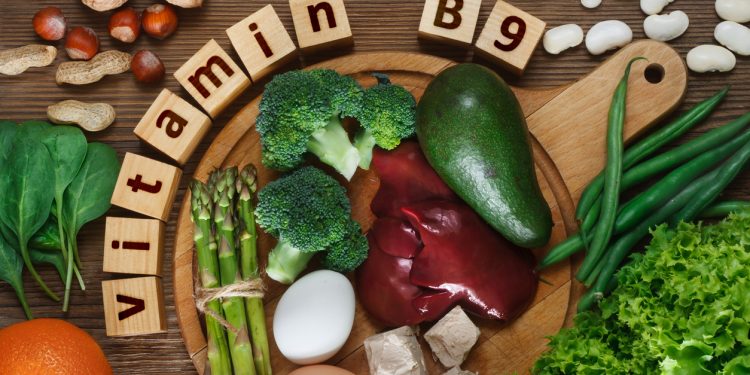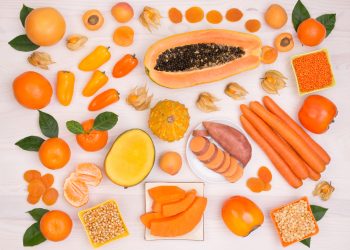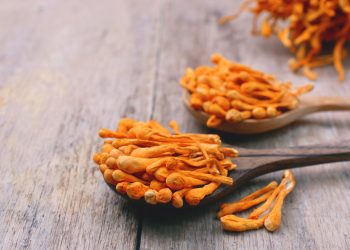B vitamins are among the most obviously necessary nutrients. Without them, your body couldn’t turn food into cellular energy or produce new red blood cells. Even the slightest deficiency in B vitamins can lower cognitive function and increase your chances of contracting disease.
And perhaps the very most important B vitamin for the continuation of our species is vitamin B8, also known as folate. Folate helps our cells divide and multiply at the appropriate speed — a trait that becomes especially important during the miraculously fast growth seen in pregnancy.
Keep reading to learn more about folate’s many benefits. We’ll also be going over 5 great places to find it.
- Why is folate so important?
- Folate’s many health benefits
- 5 foods that are high in folate
- Beef liver
- Spinach
- Black-eyed peas
- White rice
- Asparagus
Why is folate so important?
Most nutritionists and biochemists agree that there are 13 essential nutrients one must ingest to survive and thrive.
Of these 13 essential nutrients, 8 are B vitamins.
And of these 8 B vitamins, one of them is — you guessed it — folate. Folate is a somewhat general term for an entire small group of water-soluble B vitamins, including folic acid, folinic acid, and methyl folate, just to name a few. While natural types of folate are metabolised into something called tetrahydrofolate once ingested, synthetic forms like folic acid aren’t entirely absorbed. [1]
What happens in folate deficiency?
Folate’s importance becomes obvious when one considers what happens during a deficiency. Signs and symptoms of folate deficiency include: [2]
- Intense fatigue
- Lack of appetite
- Sickly, pale-hued skin
- Chronic low energy levels
- Chronic irritation/irritability
- Smooth and/or tender tongue
- Diarrhea or other bowel irregularities
Folate deficiency becomes even more serious for women who are pregnant or hope to become pregnant. A deficiency at this time can greatly increase the future infant’s risk of cognitive and/or developmental defects. [3]
Folate’s many health benefits
When one’s dietary folate intake is adequate, on the other hand, all sorts of other facets of health tend to fall neatly into place. Adequate folate levels are associated with improved cognition, improved mood, reduced rates of cancer, better circulation, and more.
At the heart of many of folate’s top benefits is its effects on red blood cells, or RBC’s. Once it’s reached the bloodstream, special folate transporters shuttle the vitamin directly into RBC’s, where it proceeds to work its magic and help these cells develop properly.
Folate can also reduce your body’s levels of homocysteine, an amino acid whose buildup within serum can otherwise become problematic. Lower homocysteine is associated with lower levels of heart disease and a longer lifespan. [4]
As we mentioned above, folate is especially important for pregnant women. It’s so important for this demographic, in fact, that most governments have mandated that certain foods be fortified with synthetic folic acid. While folic acid has indeed reduced the occurrence of certain types of birth defects, its intake is also linked to certain types of cancer. There are better options — that is, better forms of folate — available.
5 foods that are high in folate
Studies show that getting your folate from whole-foods sources is far superior to getting it from synthetically fortified products. Below are 5 of the best natural sources of folate. Mix and match them at your discretion and you should be hitting your RDA with ease. (It’s 200 micrograms per day for adults and 400 micrograms for pregnant women, just in case you were wondering.)
- Beef liver
- Spinach
- Black-eyed peas
- White rice
- Asparagus
Beef liver
Beef liver is so rich in folate and other vital nutrients that some anthropologists suspect it played a role in human evolution. It sure played a role in the rituals of many a native American tribe: “when fresh seal is eaten after the hunt,” one expert explains, “hunters first eat pieces of liver, which is described as rich in blood, or they use a tea cup to gather some blood to drink.” [5]
A small serving of beef liver contains 215 micrograms of folate — enough to exceed most peoples’ RDA. It’s also an exceptional source of other B vitamins, including B1, B6, and B12.
In other good news, research from decades ago found that beef liver could reverse the passing on of ‘genetic’ diseases from one generation to the next. In light of folate’s importance during the gestation period, beef liver’s folate content could be partially responsible for these intergenerational effects.
If you don’t enjoy the taste of fresh beef liver, don’t panic. Just opt for one of our liver-infused, folate-rich organ meat capsules instead.
Spinach
Spinach is another great folate source. each serving contains 131 micrograms of the vitamin, which is equivalent to two-thirds of one’s RDA. Spinach is rich in other hard-to-find nutrients, too, and its highly alkaline pH may set the stage for muscle growth. Perhaps Popeye the sailor was on to something…
Black-eyed peas
Black-eyed peas aren’t just the name of a pioneering band; they’re also a surprisingly rich source of dietary folate! A single serving contains just over half of one’s RDA. That being said, the antinutrients in black-eyed peas may negate some of this folate’s absorption. Sprouting your beans before enjoying may ‘unlock’ their folate content.
Asparagus
Asparagus is yet another plant-based folate source. Each serving of it contains 89 micrograms of folate, which equates to roughly 44% of your RDA. Asparagus is also rich in vitamin C, vitamin B6, and manganese.
Other great folate sources
Beef liver isn’t the only animal liver high in folate, chicken liver is, too. Beyond that, plant sources of folate also abound: lettuce, turnip greens, parsley, broccoli, and beets are all good sources. [6]
Summing things up
Folate is one of the few nutrients that humanity couldn’t live without. You could obtain your folate from the synthetic variants found in fortified foods…but why settle for that? Nature has provided us with far better sources of this vitamin, including fresh and dried beef liver, spinach, and a whole host of other tasty vegetables. Be sure to eat a few extra servings of these foods today — your future offspring may thank you.








